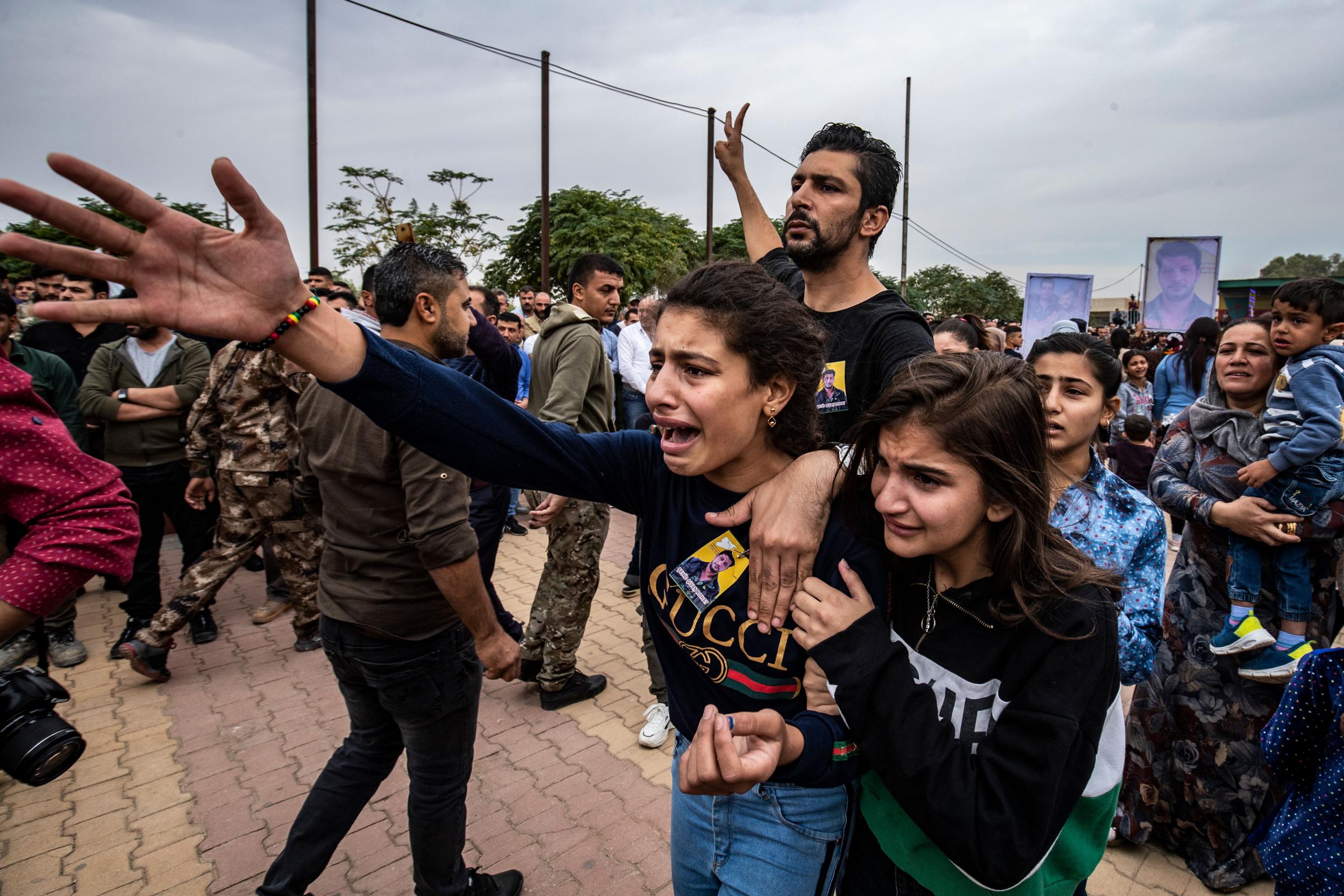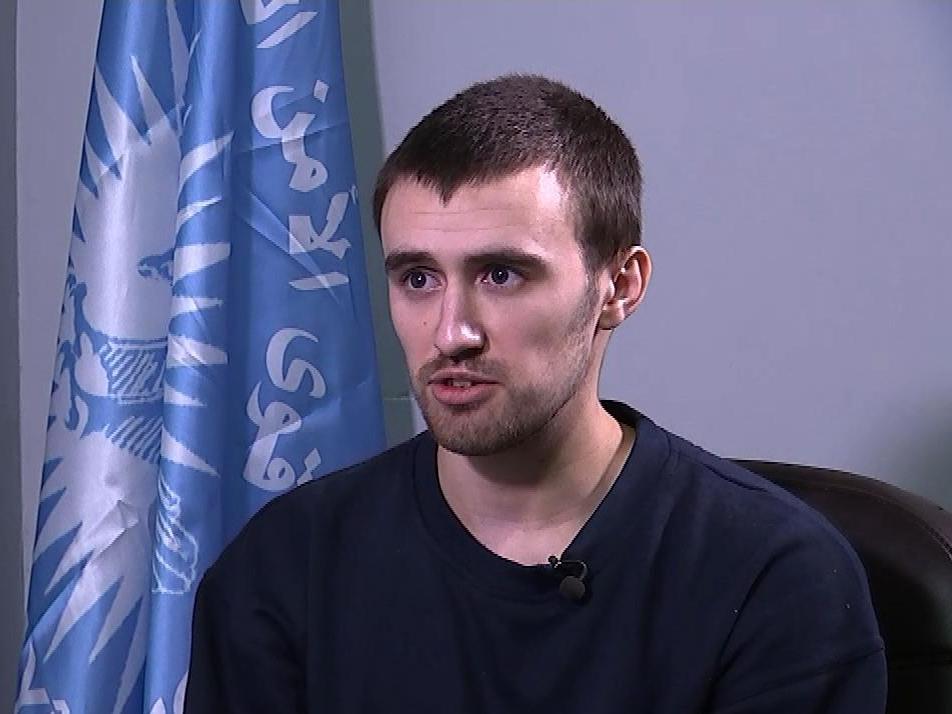Syrians on both sides of divisive war fearful of Turkey-Russia deal: ‘The price is our lives’
Warring sides in Syria’s northeast wary of truce and fear a return of the Assad regime, writes Bel Trew


Your support helps us to tell the story
From reproductive rights to climate change to Big Tech, The Independent is on the ground when the story is developing. Whether it's investigating the financials of Elon Musk's pro-Trump PAC or producing our latest documentary, 'The A Word', which shines a light on the American women fighting for reproductive rights, we know how important it is to parse out the facts from the messaging.
At such a critical moment in US history, we need reporters on the ground. Your donation allows us to keep sending journalists to speak to both sides of the story.
The Independent is trusted by Americans across the entire political spectrum. And unlike many other quality news outlets, we choose not to lock Americans out of our reporting and analysis with paywalls. We believe quality journalism should be available to everyone, paid for by those who can afford it.
Your support makes all the difference.Donald Trump heralded this week’s ceasefire deal in northeastern Syria as “a great job ... and something very special”. Turkish president Erdogan called it “historic”. Vladimir Putin said it was “substantive” and “important”.
But on both sides of the battle lines in the country’s northeast, there are growing fears that of all the players in the conflict, it was the Syrians who came out as the losers.
“Unfortunately, the winners are US, Turkey and Russia, and the price will be paid by the Syrian people,” said Mahmoud, an Arab resident of Tal Abyad, a town at the heart of the fighting along the Turkish-Syrian border.
He told The Independent that like him, many within the non-Kurdish population of northeast Syria had tentatively supported Turkish troops and their Syrian rebel allies when they launched their offensive against the Kurds two weeks ago. But that has changed since Erdogan and Putin revealed the details of the agreement, which could see significant territorial gains for Syrian government forces in the former Kurdish areas and joint Turkish-Russian patrols of the border.
“There are many worries about [Bashar] al-Assad’s forces entering the area with the Russians and taking control over the region, which would be a disaster,” he continued.
“From the Kurdish side, there are fears of Turkey not allowing Kurds to return home, about a change in the demographics of the area.”
“We all feel the international community is only interested in their interests even if the price is our lives,” he added.
Mahmoud's bitterness was echoed by Turkish-backed Syrian rebels who spearheaded Turkey’s controversial incursion into northern Syria.
“The agreement is not as good as we hoped for,” said one Syrian National Army fighter speaking from the frontline town of Ras al-Ayn. He asked to remain anonymous, fearing for his life.
“This is not what we fought for. Yes, I’m very worried,” he told The Independent.
Two weeks ago, Turkey launched a cross-border offensive to repel Syrian Kurdish forces it regards as a terrorist for its links to Turkish insurgent group the Kurdistan Workers Party (PKK).
Erdogan also hopes to build a “safe zone” to repatriate hundreds of thousands of Syrian refugees currently in Turkey.
More than 176,000 people have been displaced and about 500 Isis militants have broken free from detention centres during the two-week long conflict.
Outgunned, the Kurds, who had been Washington’s closest ally in the battle against Isis, were forced to relinquish hundreds of kilometres of land including the strategic border towns of Ras al-Ayn and Tal Abyad.
They had counted on support from the US but just days before the operation began, Trump was accused of green-lighting the offensive by announcing that US troops would pull back and not hinder the imminent attack.
And so, the Kurds struck a last-minute deal with President Bashar al-Assad, who sent government troops into northeastern Syria for the first time in five years.
The US imposed sanctions on Turkey, a key Nato ally, while other countries including the UK cancelled weapons contracts with Ankara. Rights groups released reports that Turkish-led forces had likely committed war crimes including indiscriminate strikes and execution-style killings of Kurdish politicians.
But the embarrassing Nato fracture appeared to come to an end on Wednesday when Trump said he would lift the punitive measures on Turkey as it had agreed to a permanent ceasefire.
Under the deal outlined by Russia the day before, the Kurds would withdraw past a 30km buffer zone along the Turkish border. Syrian government “border guards” would be deployed with Russia military police to ensure this. Turkey and Russia would run join patrols at 10km.
“Countless lives are now being saved as a result of our negotiations with Turkey,” Trump said from the White House on Wednesday, taking credit for the agreement.
It is “an outcome reached without spilling one drop of American blood”, he added.
But back in Syria many began to worry.
Mazloum Abdi, the commander-in-chief of the Kurdish-led Syrian Democratic Forces, thanked Trump and Putin for the assistance in brokering the truce. However, he also “expressed reservations about some items of the agreement” without elaborating.
Panicked members of the Kurdish autonomous administration are expected to meet Russian officials soon to express their fears about some of terms. No one would go into details.
Among the most contentious parts for the Kurds is Ankara’s plan to repatriate Syrian refugees in Turkey to northeast Syria, changing the demographics of the area.
Another sticking point is likely to concern Kurdish fighters evacuating the commercial hub of Manbij, which is home to some 300,000 people and is located just 30km from the border.
“Until now no one has explained to us what will happen to cities on the borderlines, and how the Syrian army will be deployed,” Akram, a Kurdish reporter near Manbij, told The Independent.
“Will the regime take back control? What would happen to the autonomy we have?”
He said the Kurds were also concerned about the behaviour of pro-Turkish forces who have been accused by rights groups of committing war crimes including summary executions.
“All the Kurdish forces withdrawing stirs fear in us, what will the pro-Turkish forces do?” he asked.
Ahmed, who works with the Kurdish Red Crescent and asked that his real name be withheld, raised concerns about local medical personnel who have worked closely with the international coalition fighting Isis and foreign NGOs that are not recognised by the regime.
“Assad regime’s security branches are likely to assassinate many people here since we are accused of treason for dealing with a foreign country and the international coalition,” he said.
Ahmed also works at Roj displaced camp, which is home to at least 950 foreign affiliates of Isis including ex-Briton Shamima Begum, one of a trio of girls from Bethnal Green in east London who joined Isis.
He was worried about who would take over the Isis camps and prisons.
These fears were also echoed in Qamishli, a Kurdish border town. It is home to several key Isis detention centres, including a prison holding former British citizen Jack Letts or “Jihadi Jack”.

Under the agreement, Kurdish forces would have to vacate the city but Turkish troops are not permitted to patrol, leaving only the regime.
“Here the Kurdish government used to run everything: the schools, the administration, the camps, the prisons – what will happen when they have to leave?” Sara, a Kurdish resident, asked.
“The other big fear here is compulsory military conscription into the government army, we are worried about our young men, our boys,” she added.
On the other side of the conflict in Ras al-Ayn, and Tal Abyad, Turkish-backed Syrian rebels and their supporters also voiced fears since they say they are considered “the enemies of the Syrian government”.
“This is a victory for Turkish diplomacy, but we are worried about control of the regime and [its allies] Iranian militias over the eastern region. This was not stipulated in the agreement with Russia,” one pro-Turkey Syrian fighter said.
Outside Tal Abyad, Mahmoud summed it up.
“These countries sing human rights slogans but only care about their own good,” he said.
“We hope peace, love and security prevail in their countries and we hope death would leave ours.”
Join our commenting forum
Join thought-provoking conversations, follow other Independent readers and see their replies
Comments